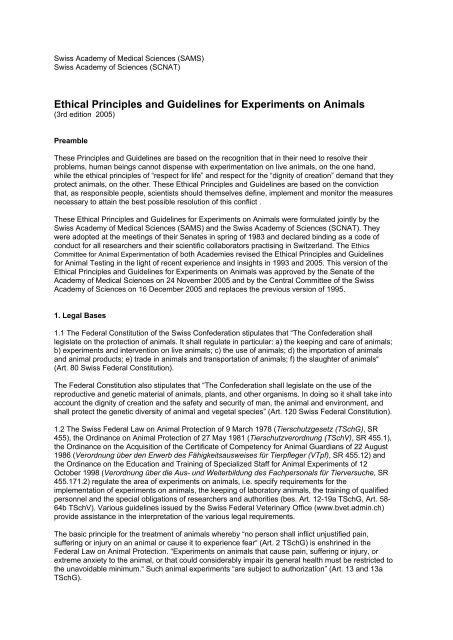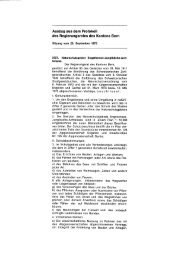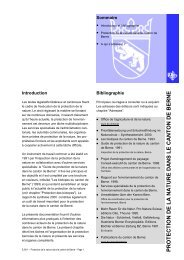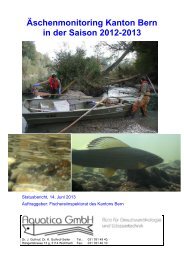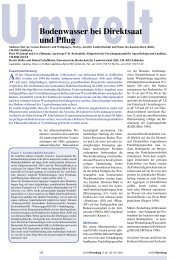Ethical Principles and Guidelines
Ethical Principles and Guidelines
Ethical Principles and Guidelines
- No tags were found...
You also want an ePaper? Increase the reach of your titles
YUMPU automatically turns print PDFs into web optimized ePapers that Google loves.
3. <strong>Ethical</strong> Requirements for the Admissibility of Animal Experiments3.1 The more essential <strong>and</strong> significant the knowledge to be gained from an animal experiment fromthe human perspective, the easier it is to justify the experiment.3.2 The more severe or lasting the potential suffering of the animal, the more pressing the question asto the reasonableness <strong>and</strong> acceptability of an experiment.3.3 Research tests on animals must conform to the established principles <strong>and</strong> precepts of science. Inparticular, the targeted results must lie clearly beyond the limits of current knowledge, the hypothesisto be tested must be reasonable <strong>and</strong> the selected procedures must be promising <strong>and</strong> consistent withthe relevant status of research.3.4 Experiments on animals are fundamentally ethically acceptable if this has been demonstratedthrough the balancing of ethical concerns for each individual experiment; these include, in particular,:- experiments on animals which visibly enhance the life <strong>and</strong> health of human beings <strong>and</strong> animals orthe protection of the environment; i.e. experiments with prophylactic, diagnostic <strong>and</strong> therapeuticobjectives in the fields of medicine <strong>and</strong> veterinary medicine;- experiments on animals which – even in the absence of directly identifiable benefits for life <strong>and</strong>health – serve the quest for new knowledge as they are very likely to lead to a significant gain inknowledge in relation to the structure, function <strong>and</strong> behaviour of living organisms;- experiments on animals carried out in the context of education <strong>and</strong> training in which no otherpossibility exists for achieving the necessary learning targets; such targets include the gaining of abetter underst<strong>and</strong>ing of living phenomena <strong>and</strong> the imparting of the necessary skills for theimplementation of experiments on animals <strong>and</strong> operating on human beings.3.5 Certain experimental set-ups can be expected to cause such severe suffering for animals that theweighing up of ethical concerns will always fall in favour of the animals. If it is not possible to find lessharmful <strong>and</strong> more ethically acceptable test arrangements by changing the research hypothesis, it willbe necessary to refrain from carrying out the experiment <strong>and</strong> to forgo the expected gain in knowledge.3.6 Experiments on animals whose sole objective is the research <strong>and</strong> development of luxury consumergoods must not be carried out.4. <strong>Ethical</strong> Requirements for the Conduct of Experiments on Animals4.1 Responsibility must be assumed for the conduct of an animal experiment throughout the entireduration of the experiment which involves the following phases:- definition of objectives, selection of animals (species, breed, strain), ethical balancing, testplan, application for authorization, acquisition <strong>and</strong> keeping of the animals, preparation of theanimals for the intervention <strong>and</strong> treatment;- conduct of the experiment, intervention <strong>and</strong> treatment, monitoring of the animals,documentation of all intervention <strong>and</strong> treatment, measurements <strong>and</strong> observations;- conclusion of the final experiment followed by restoration of the welfare of the animals orkilling of the animals;- evaluation of the research findings, publication, reporting to the relevant authorities.4.2 The ethical approach of respect for life requires that the maximum gain in knowledge is achievedusing the minimum possible number of laboratory animals <strong>and</strong> the limitation of their suffering to theessential minimum.If the suffering of individual animals can be reduced significantly through the use of a larger number ofanimals, the reduction of individual suffering shall take priority over the reduction of the number ofanimals used in the experiment.4.3 All persons involved in animal experiments are obliged to support the welfare <strong>and</strong> minimumpossible suffering of the laboratory animal.4.4 Experiments on animals shall be carried out in accordance with the latest developments. Knownprophylactic, diagnostic <strong>and</strong> therapeutic processes shall be taken into account <strong>and</strong> the scientificguidelines provided by international expert bodies shall be observed.
4.5 If pain, suffering or stress are inevitable concomitants of an experiment, their duration <strong>and</strong> intensitymust be limited to the minimum. To this end, the animals shall be monitored by specially trainedpersonnel in accordance with predefined criteria <strong>and</strong> at predefined times <strong>and</strong> measures necessary toalleviate suffering shall be taken insofar as this is compatible with the objective of the experiment. Theanimal must be able to express its sensations <strong>and</strong> where possible avoid painful stimuli. Hence, the useof substances that induce paralysis without loss of consciousness <strong>and</strong> analgesic effects isunauthorized.4.6 In all experiments that give rise to long or chronic suffering or necessitate repeated intervention, allpossible measures must be undertaken to alleviate suffering <strong>and</strong> dispel fear <strong>and</strong> anxiety. Theprofessional care of the animals, before, during <strong>and</strong> after the experiment are particularly important inthis context.4.7 Continuous physical restraint may only be resorted to if other processes have been considered<strong>and</strong> deemed unsuitable. All possible measures must be taken to alleviate fear <strong>and</strong> anxiety, inparticular the careful <strong>and</strong> protective familiarization of the animal with the test conditions.4.8 If distressing measures, such as the restriction of food or water or the withholding of otherimportant environmental factors or administration of pain stimuli are unavoidable, they must berecorded in detail in the test protocol. To ensure that the distress caused does not exceed anacceptable level, the effects of these measures on the animal shall be monitored through thecollection of the relevant data.4.9 To avoid unnecessary suffering, clearly defined termination criteria must be established for allanimal experiments. Animals which experience serious suffering must be killed as quickly as possibleusing a pain-free method.4.10 If possible, animals on which experiments are carried out should be obtained from authorizedlaboratory-animal breeding units. Animals of unknown origin must not be used in experiments.Particular restraint should be exercised in relation to the use animals from species that live in the wild.Even if they cause little pain or distress, experiments on species threatened with extinction are onlyjustifiable if they contribute to the conservation of the species in question.4.11 Laboratory animals should be sheltered <strong>and</strong> cared for in accordance with the principles of properanimal guardianship. Every effort must be made to ensure that pens <strong>and</strong> cages are well made <strong>and</strong>generously sized <strong>and</strong> that the animals have adequate opportunities for activity <strong>and</strong> social contact. Thelegal regulations concerning the keeping of such animals merely constitute minimum requirements. Ifthey have been overtaken by new information <strong>and</strong> insights, keeping practices that exceed the legalrequirements should be selected.4.12 Animals with genetic diseases <strong>and</strong> defects or behavioural disorders may only be bred if their useis deemed essential following careful ethical balancing. In the case of the breeding of geneticallymodified animals, the risk of the development of defects, suffering or pain must be particularlythoroughly evaluated. To avoid unnecessary suffering, clearly-defined criteria must be defined,according to which animals shall be killed as soon as possible <strong>and</strong> stocks shall not be developedfurther.4.13 If the breeding of animals with diseases, defects, or behavioural disorders is unavoidable, itshould only be done for a short time <strong>and</strong> the numbers produced should be strictly tailored torequirements. The animals should be introduced into the experiment as quickly as possible <strong>and</strong>immediately killed when the test results have been obtained. If the conservation of breeds associatedwith such suffering is necessary, conservation processes other than maintenance breeding should besought.
5. Responsibilities5.1 The main requirements of persons involved in all animal experiments are professional competency<strong>and</strong> a declared willingness to assume responsibility in relation to the use of laboratory animals <strong>and</strong> tocomply with the relevant legal requirements.Investigators bear the moral, scientific <strong>and</strong> legal responsibility for the planning, justification (throughethical balancing) <strong>and</strong> implementation of experiments on animals. This responsibility is shared by allother persons involved in such experiments; they must, therefore, have full right of expression <strong>and</strong>have the right to refuse to participate in experiments without negative consequences.5.2 Researchers employed in Switzerl<strong>and</strong> shall refrain from carrying out experiments on animalsabroad that contravene the Swiss animal welfare legislation <strong>and</strong> cannot be justified on the basis ofthese <strong>Ethical</strong> <strong>Principles</strong> <strong>and</strong> <strong>Guidelines</strong> <strong>and</strong> from participating in their implementation abroad.They shall also refrain from procuring laboratory animals from abroad if their breeding, keeping <strong>and</strong>treatment cannot be justified in accordance with these <strong>Ethical</strong> <strong>Principles</strong> <strong>and</strong> <strong>Guidelines</strong>.The conditions should be strived for in relation to the procurement of foreign products created usinganimal testing.5.3 Persons involved in research are obliged to take <strong>and</strong> support all possible measures to limit painful<strong>and</strong> stressful experiments on animals.Persons involved in research are obliged to subject the suitability of all established <strong>and</strong> officiallypromoted animal testing methods to regular critical assessment.They are also obliged to promote the exchange of information about the results of experiments onanimals so as to avoid unnecessary experiments <strong>and</strong>, where applicable, to support the updating ofregulations <strong>and</strong> methods.5.4 Persons involved in scientific research are obliged to do further training in animal welfare <strong>and</strong> tosupport the development of alternative research methods.5.5 Where possible, scientists shall actively promote the open dissemination of information to thepublic <strong>and</strong> the media about the importance, necessity, methodology <strong>and</strong> results of experiments onanimals. They shall also work towards the critical evaluation of society’s dem<strong>and</strong> for well-being <strong>and</strong>safety generated through experiments on animals.They shall make every effort to ensure maximum transparency in the dissemination of informationabout experiments on animals <strong>and</strong> shall be willing to provide access to interested parties to theirexperiments <strong>and</strong> animal keeping within the scope of the available technical, personnel <strong>and</strong> dataprotection facilities.6. Recommendations for Institutions6.1 Institutions which carry out experiments on animals are urged to create independent institutions forethical concerns relating to animal testing for staff involved in experiments.6.2 Institutions which carry out experiments must constantly promote the training of those involved inexperiments on animals <strong>and</strong> monitor their knowledge <strong>and</strong> skills in a suitable way.It is particularly important that people who will be authorized to carry out experiments on animals in thefuture be made aware of the moral principles involved in the treatment of animals in the context of theirthird-level education.6.3 Institutions for the advancement of science must not support animal testing that contravenes these<strong>Ethical</strong> <strong>Principles</strong> <strong>and</strong> <strong>Guidelines</strong>. The academic boards of scientific journals <strong>and</strong> reviewers ofpublications shall refuse to accept publications based on studies that contravene these <strong>Ethical</strong><strong>Principles</strong> <strong>and</strong> <strong>Guidelines</strong>.


